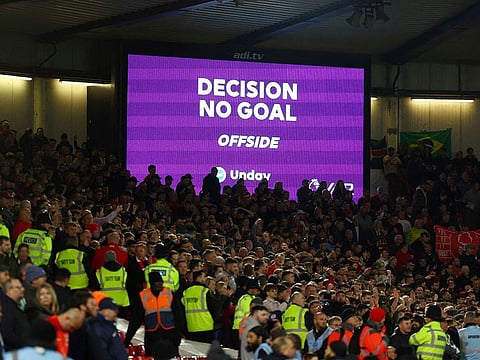Why the absence of VAR in the FA Cup is refreshing
No VAR brought a refreshing simplicity to the beautiful game during round 4 of the FA Cup

The FA Cup, the world's oldest domestic cup competition, has always been steeped in tradition.
This season, it has gifted fans a nostalgic throwback to football's roots by not using VAR until the fifth round. The fourth round of the competition provided a vivid reminder of why the absence of video technology can make football feel more authentic, even if it comes with its share of controversy.
While Premier League clubs and supporters are accustomed to the forensic analysis of VAR, the FA Cup's decision to delay its use has brought a refreshing simplicity to the beautiful game.
For Leicester City, Birmingham, and Chelsea, it also served as a painful reminder of how football operated before technology stepped in.
Celebrating without the shadow of VAR
One of the most significant criticisms of VAR in modern football is its ability to dampen the raw emotion of a goal. Fans who would once leap out of their seats in unbridled joy are now hesitant, glancing nervously at the referee or waiting for confirmation from Stockley Park.
In the fourth round of the FA Cup, however, supporters didn't have to endure that agonising wait. Manchester United's late winner against Leicester City, nodded in by Harry Maguire, was celebrated without hesitation at Old Trafford, even if replays suggested the goal might have been offside. Leicester fans left frustrated by the decision may not share the sentiment, but for neutrals, it felt like a return to the kind of drama that made football the game it is.
Controversial decisions have always been part of football’s narrative. From Diego Maradona’s infamous “Hand of God” to Frank Lampard’s ghost goal at the World Cup in 2010, these moments have sparked debates, created legends, and united fans in pub discussions for decades. Without VAR in the FA Cup's early rounds, those storylines are back in full force.
Take Birmingham’s tie with Newcastle, for example. The Magpies scored a goal that appeared questionable as the whole of the ball may not have crossed the line. Without goal line technology or VAR to dissect the incident, the decision stood, much to the dismay of Birmingham supporters. Similarly, Chelsea’s appeals for a handball against Brighton were dismissed on the field, leaving fans to argue over replays without the certainty that VAR might have provided.
While mistakes are frustrating for those on the receiving end, they remind us why football is so deeply human. The game’s inherent imperfections create its charm, and its controversies make it compelling.
As the Premier League continues to refine its use of VAR, the FA Cup’s technology-free fourth round has sparked a conversation about whether football is better off with or without it. The Premier League recently released data claiming improved accuracy, with 13 errors from 70 interventions this season compared to 20 from 61 last year. Impressively, 100% of offside decisions in the top flight have been correct.
These improvements highlight VAR's value in ensuring fairness, but they also highlight how sterile the game can feel when dissected frame by frame. For all its flaws, football has always thrived on its unpredictability.
The fourth round reminded us of this in spades, with fans living through the highs and lows in real time, free from the technological delays that have become commonplace in the Premier League.
A question of balance
While there’s something undeniably nostalgic about a VAR-free FA Cup, the competition’s decision to introduce the technology in the fifth round onwards reflects the realities of modern football. The stakes only get higher as teams progress, and ensuring accuracy becomes increasingly important.
However, the debate isn’t likely to go away. Fans of Leicester, Birmingham, and Chelsea may argue that they were denied fairness, while others will celebrate the raw, unsanitised nature of the earlier rounds. Ultimately, the fourth round served as a reminder of what football used to be – and a chance to reflect on what it has become.
Sign up for the Daily Briefing
Get the latest news and updates straight to your inbox



